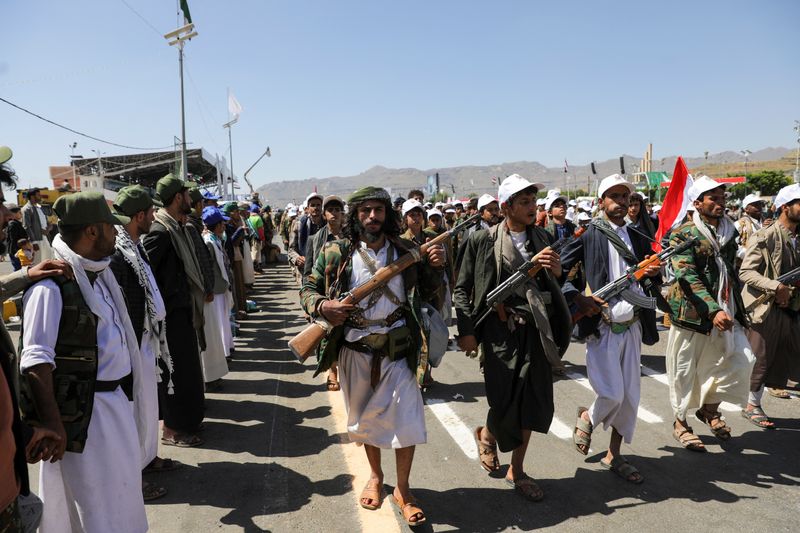By Michelle Nichols and John Irish
UNITED NATIONS (Reuters) - Yemen's Houthi rebels have grown "from a localised armed group with limited capabilities to a powerful military organization" with the help of Iran's elite Revolutionary Guard Corps (IRGC), Lebanon's Hezbollah and Iraqi specialists, according to a confidential report by U.N. sanctions monitors.
The independent panel of experts, who report annually to the U.N. Security Council, said Houthi fighters had been receiving tactical and technical training outside Yemen, traveling on fake passports to Iran, Lebanon and Iraq.
Over the past year the Houthis have launched repeated drone and missile strikes on ships in the crucial Red Sea shipping channels to show support for Palestinians in the Gaza war with Israel, disrupting global maritime trade by forcing shipping firms to divert cargos.
"The multiple testimonies gathered by the panel from military experts, Yemeni officials and even individuals close to the Houthis, indicate that they do not have the capacity to develop and produce, without foreign support, complex weapon systems," the U.N. experts wrote in their latest report, seen by Reuters.
"The scale, nature and the extent of transfers of diverse military materiel and technology provided to the Houthis from external sources, including financial support and training of its combatants, is unprecedented," they said.
The Houthis did not immediately respond to a request for comment on the U.N. report.
The sanctions monitors said weapons systems operated by the Houthis were similar to those produced and operated by Iran or armed groups of the Tehran-backed "Axis of Resistance" opposed to Israel and U.S. influence in the Middle East.
"This transformation has been possible due to the transfer of materiel and the assistance and training provided by IRGC-QF, Hezbollah, and Iraqi specialists and technicians to the Houthis," the U.N. experts reported to the 15-member Security Council Yemen sanctions committee. "IRGC-QF" refers to the Quds Force, the overseas branch of the Revolutionary Guards.
Built up over years or decades of Iranian support, the "Axis of Resistance" includes the Houthis, Palestinian militants Hamas, Hezbollah and various armed groups in Iraq and Syria.
The Houthis have effectively been under a U.N. arms embargo since 2015. Iran has repeatedly denied supplying weapons to the group. Iran's mission to the U.N. did not immediately respond to a request for comment on the U.N. sanctions monitors report.
At the United Nations on Wednesday, Iran's Foreign Minister Abbas Araqchi told reporters before a Security Council meeting that his country supported Hezbollah and would not remain indifferent if the Lebanon conflict with Israel spiraled.
The U.N. sanctions monitors also expressed concern about an increasing collaboration between the Houthis and al Qaeda in the Arabian Peninsula.
"Both have agreed to cease internal conflict, transfer weapons, and coordinate on attacks against the forces of the Government of Yemen," they said. "Additionally, increased smuggling activities, involving small and light weapons (SALWs) are observed between the Houthis and Al-Shabaab, with indications of shared military supplies or a common supplier."

On the issue of fake passports, the U.N. sanctions monitors said that the Houthis issue the counterfeit documents to people who "act on their behalf, for their support or under their control."
"These people are tasked with the procurement and/or transfer of illicit goods or weapons or they travel abroad to participate in military training," they wrote in the 38-page report that includes hundreds of pages of annexes.